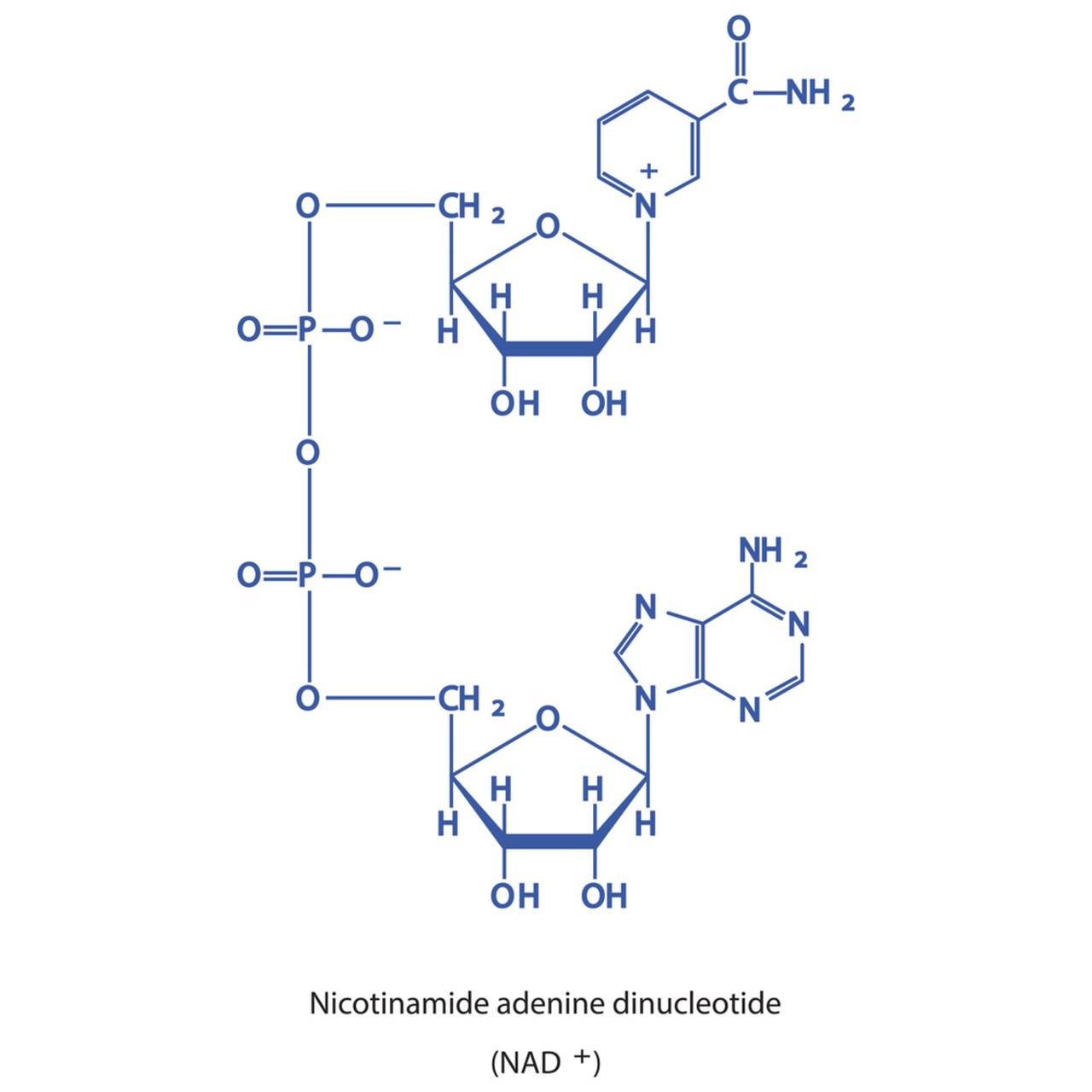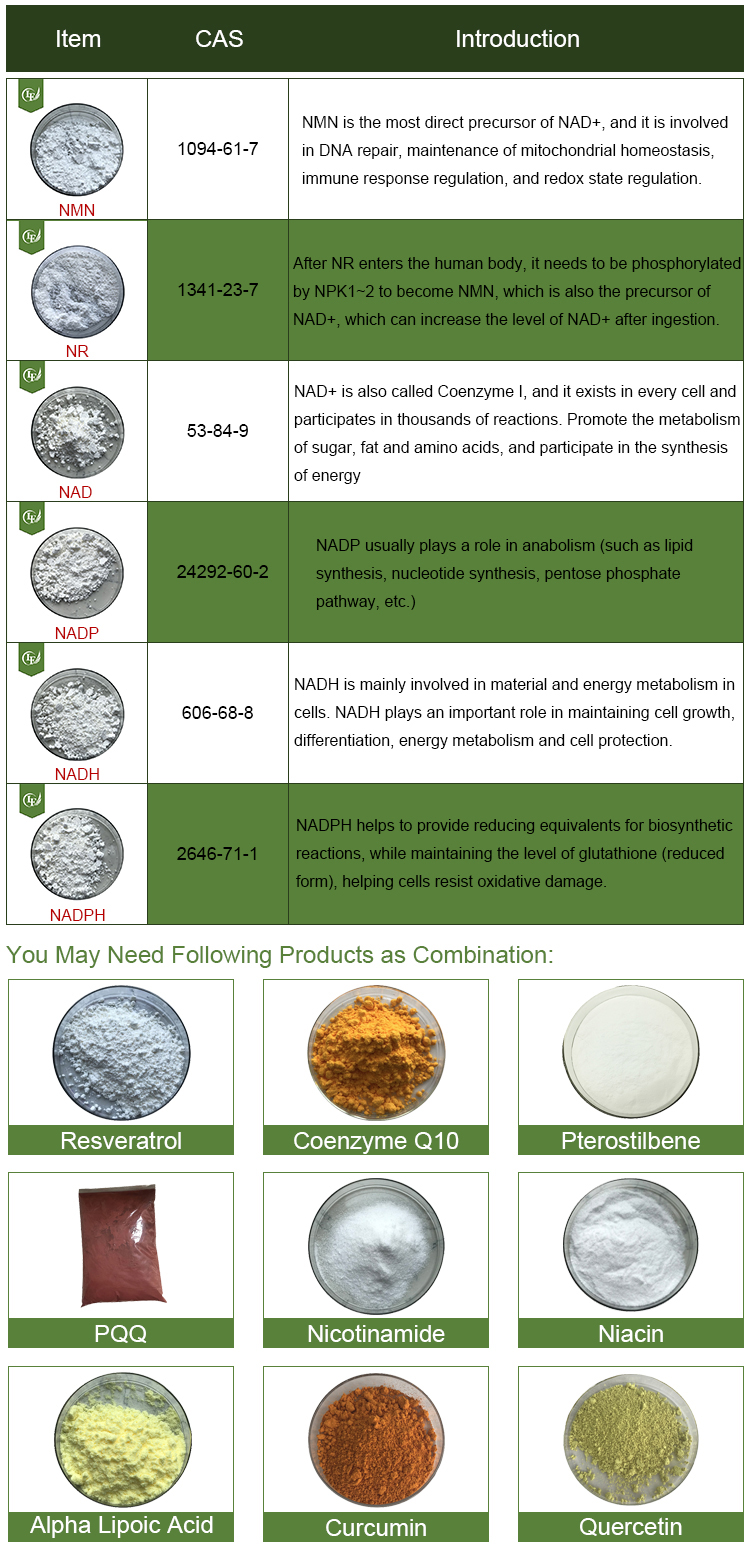NMN(Nicotinamide mononucleotide) is a molecule that has gained attention for its potential role in promoting health and longevity. NMN is a precursor to nicotinamide adenine dinucleotide (NAD+), a coenzyme that plays a critical role in various cellular processes, including energy metabolism and DNA repair. Here’s an overview of the efficacy and functions of NMN:
NAD+ Precursor: NMN is a precursor to NAD+, which is essential for the functioning of various enzymes involved in cellular energy production (through processes like glycolysis and oxidative phosphorylation) and the maintenance of DNA integrity. NAD+ levels tend to decline with age, and this decline is associated with various age-related health issues. NMN supplementation is thought to help increase NAD+ levels in the body.
Energy Production: By increasing NAD+ levels, NMN may support the efficient production of adenosine triphosphate (ATP), the primary energy currency in cells. This could potentially help improve overall energy levels and mitochondrial function.

DNA Repair: NAD+ is involved in DNA repair mechanisms, particularly through the actions of enzymes called sirtuins. Higher NAD+ levels could enhance DNA repair processes, potentially reducing the risk of DNA damage-related diseases and possibly slowing the aging process.
Longevity: Some animal studies have suggested that NMN supplementation might extend lifespan and improve healthspan in mice. However, these findings are preliminary, and more research is needed to confirm these effects in humans.
Metabolic Benefits: NMN has been investigated for its potential in improving metabolic health. It may help regulate glucose metabolism and improve insulin sensitivity, which could be beneficial for individuals with conditions like type 2 diabetes or metabolic syndrome.
Neuroprotection: There is some research indicating that NMN may have neuroprotective properties. By increasing NAD+ levels, it could potentially help protect neurons from damage and support cognitive function.
Exercise Performance: Some studies suggest that NMN supplementation might improve exercise performance and endurance by enhancing mitochondrial function and energy metabolism. Athletes and individuals looking to enhance their physical performance may be interested in this potential benefit.
It’s important to note that while the potential benefits of NMN are promising, much of the research has been conducted in animal models or in vitro, and human clinical trials are still ongoing to establish the safety and efficacy of NMN supplementation in humans. The long-term effects and optimal dosages for NMN are yet to be determined, and it’s important to consult with a healthcare professional before starting any supplementation regimen, as well as to be aware of potential side effects or interactions with medications. Additionally, the FDA has not approved NMN as a treatment or supplement for any specific medical condition.
Adverse effects of NMN
Nicotinamide mononucleotide (NMN) is a molecule that has gained attention for its potential health benefits, particularly in the context of aging and cellular health. While NMN is generally considered safe, like any supplement or medication, it can have potential adverse effects, especially when used inappropriately or at very high doses. Here are some of the potential adverse effects and considerations associated with NMN:
Limited Long-Term Safety Data: NMN is a relatively new supplement, and there is limited long-term safety data available. Most studies have focused on short-term use, so the long-term effects are not well understood.
Gastrointestinal Distress: Some individuals may experience mild gastrointestinal distress, such as nausea, diarrhea, or stomach cramps, when taking NMN. Adjusting the dose or taking it with food may help mitigate these symptoms.
Potential for Hypoglycemia: NMN may have the potential to lower blood sugar levels, which can be problematic for individuals with diabetes or those at risk of hypoglycemia. If you have diabetes, it’s essential to monitor your blood sugar levels closely and consult with a healthcare professional before using NMN.
Drug Interactions: NMN might interact with certain medications. For example, it may interfere with blood pressure medications or anticoagulants. If you are taking any medications, consult with a healthcare provider before starting NMN supplementation.
Allergic Reactions: In rare cases, some individuals may experience allergic reactions to NMN supplements, which can manifest as skin rashes, itching, or swelling. If you notice any allergic symptoms, discontinue use and seek medical attention.

Purity and Quality: The safety of NMN supplements can vary depending on the source and manufacturer. It’s essential to choose reputable brands and products to ensure the purity and quality of the supplement.
Dosage and Individual Variations: The optimal dosage of NMN can vary among individuals. Too high a dose may increase the risk of adverse effects. Start with a low dose and gradually increase it if needed, while monitoring your body’s response.
Ethical Considerations: NMN is often sourced from nicotinamide, which can raise ethical concerns related to animal testing and harvesting. If you have ethical concerns, consider looking for products that are cruelty-free or ethically sourced.
As with any dietary supplement, it’s essential to consult with a healthcare provider before starting NMN supplementation, especially if you have underlying health conditions or are taking medications. They can provide personalized guidance and monitor your progress to minimize potential adverse effects and optimize the benefits of NMN for your specific health goals. Additionally, maintaining a balanced diet and a healthy lifestyle is essential for overall well-being and may complement the potential benefits of NMN supplementation.
